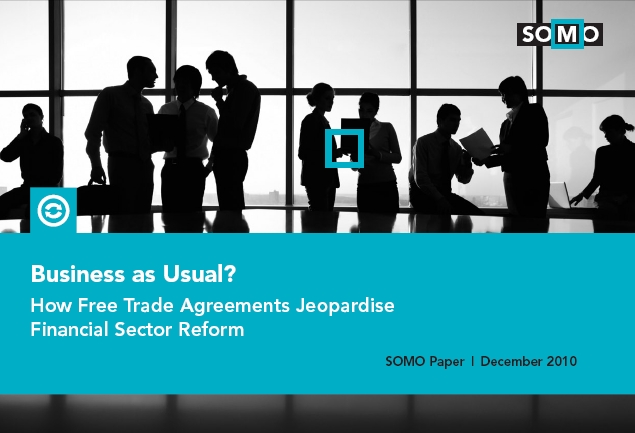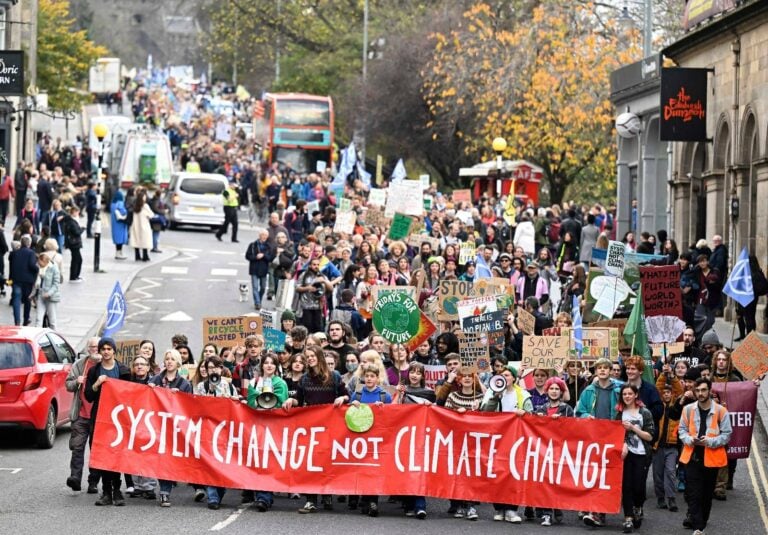
Business as usual
In contrast with the current wide-ranging financial reform agenda in the European Union (EU), the EU continues to liberalise a wide range of risky and non-risky financial services in the General Agreement on Trade in Services (GATS) and other Free Trade Agreements (FTAs) as if the financial crisis never happened. In a new SOMO publication SOMO identifies specific examples on how new EU regulations are in contrast with the pre-crisis model that is still being applied in the GATS negotiations, the Cariforum-EU Economic Partnership Agreement (EPA), and the EU-South Korea FTA.
In the new SOMO publication Business as usual, M. Vander Stichele and R. van Os identify specific examples on how new EU regulations are in contrast with the pre-crisis model that is still being applied in the GATS negotiations, the Cariforum-EU Economic Partnership Agreement (EPA), and the EU-South Korea FTA. For instance, countries are prevented to reverse, restrict, limit or halt risky derivatives trading in food commodities or foreign currencies after countries have committed themselves to liberalised derivatives trading services in GATS and FTAs. New regulations on hedge funds and credit rating agencies are in contradiction with GATS and FTA rules that discipline domestic regulation. The EU expressed doubts whether a new financial transaction tax is compatible with GATS rules. The FTAs have very restrictive rules to prevent capital controls while currently several WTO or FTA countries, including South Korea, are introducing capital controls to prevent financial bubbles caused by foreign capital inflows. Because the GATS and FTA rules that allow countries to take prudential measures are so weak and vague, this paper argues that many new financial reforms could be undermined by GATS and FTA rules if countries wished to bring them before a dispute panel. More guarantees are needed that all necessary financial reforms can be undertaken: the SOMO publication gives provides recommendations for this.
The technical nature of the issue and the lack of transparency in the decision making process have so far hampered the public and political debate. The technical arguments as well as the recommendations at the end of this SOMO publication provide opportunities to raise many concerns about the trade negotiation position by the EU, which did not change its deregulatory demands in the GATS and FTAs, in particular. In general, this publication can be used in many countries to raise the public and political debate related to financial reforms, the G-20 declarations both urging financial reform and more free trade (incl. financial services), the continuing GATS and new FTA negotiations in which many countries are engaged, etc.
This publication argues that GATS and FTAs should reverse its ‘business as usual’ regulatory approach and ensure that all financial reforms make the financial sector serve the economy at large as well as the public good rather than promoting the interests of the financial sector itself.
Related news
-
Why share buybacks are bad for the planet and peoplePosted in category:Opinion
 Myriam Vander StichelePublished on:
Myriam Vander StichelePublished on: Myriam Vander Stichele
Myriam Vander Stichele -
 The Netherlands: European champion share buybackPosted in category:Long read
The Netherlands: European champion share buybackPosted in category:Long read Rodrigo FernandezPublished on:
Rodrigo FernandezPublished on: -
 The trillion-dollar threat of climate change profiteersPosted in category:Long read
The trillion-dollar threat of climate change profiteersPosted in category:Long read Myriam Vander StichelePublished on:
Myriam Vander StichelePublished on:

